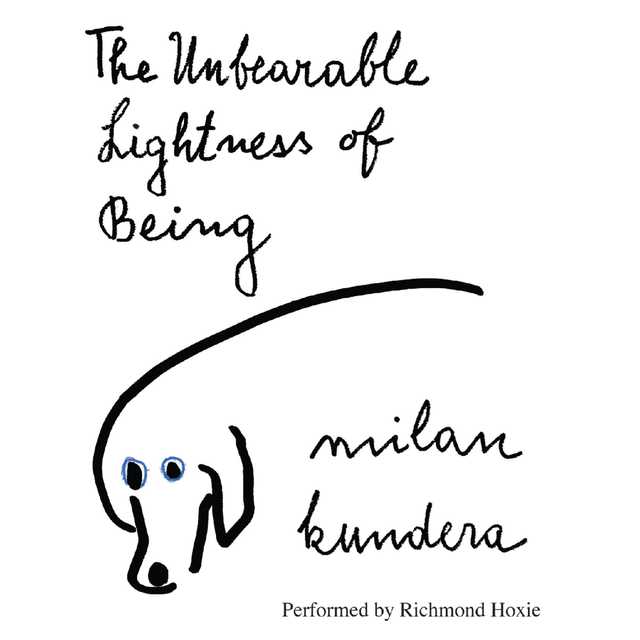The Unbearable Lightness of Being Audiobook Summary
When The Unbearable Lightness of Being was first published in English, it was hailed as “a work of the boldest mastery, originality, and richness” by critic Elizabeth Hardwick and named one of the best books of 1984 by the New York Times Book Review. It went on to win the Los Angeles Times Book Prize for Fiction and quickly became an international bestseller. Twenty years later, the novel has established itself as a modern classic. To commemorate the anniversary of its first English-language publication, HarperCollins is proud to offer a special hardcover edition.
A young woman in love with a man torn between his love for her and his incorrigible womanizing; one of his mistresses and her humbly faithful lover — these are the two couples whose story is told in this masterful novel.
Controlled by day, Tereza’s jealousy awakens by night, transformed into ineffably sad death-dreams, while Tomas, a successful surgeon, alternates loving devotion to the dependent Tereza with the ardent pursuit of other women. Sabina, an independent, free-spirited artist, lives her life as a series of betrayals — of parents, husband, country, love itself — whereas her lover, the intellectual Franz, loses all because of his earnest goodness and fidelity.
In a world in which lives are shaped by irrevocable choices and by fortuitous events, a world in which everything occurs but once, existence seems to lose its substance, its weight. Hence we feel, says the novelist, “the unbearable lightness of being” — not only as the consequence of our private acts but also in the public sphere, and the two inevitably intertwine.
This magnificent novel encompasses the extremes of comedy and tragedy, and embraces, it seems, all aspects of human existence. It juxtaposes geographically distant places (Prague, Geneva, Paris, Thailand, the United States, a forlorn Bohemian village); brilliant and playful reflections (on “eternal return,” on kitsch, on man and animals — Tomas and Tereza have a beloved doe named Karenin); and a variety of styles (from the farcical to the elegiac) to take its place as perhaps the major achievement of one of the world’s truly great writers.
Other Top Audiobooks
The Unbearable Lightness of Being Audiobook Narrator
Richmond Hoxie is the narrator of The Unbearable Lightness of Being audiobook that was written by Milan Kundera
Milan Kundera is the author of the novels The Joke, Farewell Waltz, Life Is Elsewhere, The Book of Laughter and Forgetting, The Unbearable Lightness of Being, and Immortality, and the short-story collection Laughable Loves–all originally written in Czech. His most recent novels Slowness, Identity, and Ignorance, as well as his nonfiction works The Art of the Novel, Testaments Betrayed, The Curtain, and Encounter, were originally written in French.
About the Author(s) of The Unbearable Lightness of Being
Milan Kundera is the author of The Unbearable Lightness of Being
More From the Same
- Publisher : HarperAudio
- Abraham
- American Gods [TV Tie-In]
- Dead Ringer
- House of Sand and Fog
- Prey
The Unbearable Lightness of Being Full Details
| Narrator | Richmond Hoxie |
| Length | 9 hours 37 minutes |
| Author | Milan Kundera |
| Category | |
| Publisher | HarperAudio |
| Release date | May 15, 2012 |
| ISBN | 9780062215529 |
Additional info
The publisher of the The Unbearable Lightness of Being is HarperAudio. The imprint is HarperAudio. It is supplied by HarperAudio. The ISBN-13 is 9780062215529.
Global Availability
This book is only available in the United States.
Goodreads Reviews
zuza_zaksiazkowane
June 06, 2022
4.5 Jeden z moich ulubieńców
Ahmad
August 01, 2021
(Book 256 From 1001 Books) - Nesnesitelná lehkost bytí = L’insoutenable légèreté de l’être = The Unbearable Lightness of Being, Milan KunderaThe Unbearable Lightness of Being is a 1984 novel by Milan Kundera, about two women, two men, a dog and their lives in the 1968 Prague Spring period of Czechoslovak history. From the book: “The heavier the burden, the closer our lives come to the earth, the more real and truthful they become. Conversely, the absolute absence of burden causes man to be lighter than air, to soar into heights, take leave of the earth and his earthly being, and become only half real, his movements as free as they are insignificant. What then shall we choose? Weight or lightness? ...When we want to give expression to a dramatic situation in our lives, we tend to use metaphors of heaviness. We say that something has become a great burden to us. We either bear the burden or fail and go down with it, we struggle with it, win or lose. And Sabina – what had come over her? Nothing. She had left a man because she felt like leaving him. Had he persecuted her? Had he tried to take revenge on her? No. Her drama was a drama not of heaviness but of lightness. What fell to her lot was not the burden, but the unbearable lightness of being.”عنوانها: «بار هستی»؛ «کلاه کلمنتیس»؛ نویسنده: میلان کوندرا؛ تاریخ نخستین خوانش روز هشتم ماه سپتامبر سال 1987میلادی؛ و بار دوم سال2007میلادیعنوان: بار هستی؛ نویسنده: میلان کوندرا؛ مترجم: پرویز همایون پور؛ مشخصات نشر تهران، گفتار، 1365، در 275ص، موضوع: داستانهای نویسندگان چک - سده ی 20معنوان: کلاه کلمنتیس؛ نویسنده: میلان کوندرا؛ مترجم: احمد میرعلائی؛ مشخصات نشر تهران، دماوند، 1364، در 178ص، انتشارات باغ نو نیز در سال1381هجری خورشیدی کتاب را از همین مترجم و در 127ص منتشر کرده است؛ چاپ سوم 1387؛ شابک 9647425104؛ نشر نو، 1397؛ در136ص؛ شابک 9786004901208؛ موضوع: نویسندگان چک؛ نقد و بررسی - سده 20مفهرست: یادداشت؛ «مصاحبه ای با میلان کوندرا»؛ «غرب در گروگان یا فرهنگ از صحنه بیرون میرود»؛ «جایی آن پشت و پسله ها»؛ «نامه های گمشده (کلاه کلمنتیس)»؛ «فرشته ها»؛کوندرا در توصیف قهرمانان خود میگویند: شخصیتهای رمانی که نوشته ام، امکانات خود من هستند که تحقق نیافته اند، بدین سبب هراسانم، آنها را دوست میدارم، آنها از مرزی گذر کرده اند که من فقط آن را دور زده امتاریخ بهنگام رسانی 31/05/1399هجری خورشیدی؛ 10/05/1400هجری خورشیدی؛ ا. شربیانی
emma
December 22, 2022
turns out an unbearable lightness and an unsustainable heaviness aren't that different, after all.anyway, this book is whip-smart and brain-expanding, a real pleasure to read. i don't even want to get into it - i'd prefer the pleasure stand on its own.if you like feeling smart, working hard for your books, philosophical vibes, or books with cool titles...read this please!bottom line: a book that speaks enough for itself!------------------currently-reading updatesand the Greatest Title Of All Time award goes to............------------------tbr reviewmore like the unbearably HEAVY BURDEN of being am i right
Riku
September 07, 2016
The Unbelievable Lightness of The Novel I had started reading this in 2008 and had gotten along quite a bit before I stopped reading the book for some reason and then it was forgotten. Recently, I saw the book in a bookstore and realized that I hadn't finished it. I picked it up and started it all over again since I was not entirely sure where I had left off last time. I was sure however that I had not read more than, say, 30 pages or so. I definitely could not remember reading it for a long period of time. I only remembered starting it and bits and pieces about infidelities and the russian occupation of the Czech. And so, I started reading it, sure that soon a page will come from where the story will be fresh and unread. I was soon into the fiftieth page and was amazed that as I read each page, I could distinctly remember every scene, every philosophical argument, even the exact quotes and the sequence of events that was to come immediately after the scene I was reading- But I could never remember, try as I might, what was coming two pages further into the novel. "This is what comes from reading serious books lightly and not giving them the attention they deserve," I chastised myself, angry at the thought that my habit of reading multiple books in parallel must have been the cause of this. I must, at the risk of appearing boastful, say that the reason this bothered so much was that I always used to take pride in being able to remember the books that I read almost verbatim and this experience of reading a book that I had read before with this sense of knowing and forgetting at the same time, the two sensations running circles around each other and teasing me was completely disorienting. I felt like I was on some surreal world where all that is to come was already known to me but was still being revealed one step out of tune with my time.In any case, this continued, to my bewilderment well into the two hundredth page. Even now, I could not shake the constant expectation that the story was going to go into unread new territories just 2 or 3 pages ahead of where I was. Every line I read I could remember having read before and in spite of making this mistake through so many pages, I still could not but tell myself that this time, surely, I have reached the part where I must have last closed the book three years ago.Thus I have now reached the last few pages of the book and am still trying to come to terms with what it was about this novel that made me forget it, even though I identified with the views of the author and was never bored with the plot. Was this an intentional effect or just an aberration? Will I have the same feeling if I picked up the book again a few years from today? I also feel a slight anger towards the author for playing this trick on me, for leading me on into reading the entire book again, without giving me anything new which I had not received from the book on my first reading. Usually when I decide to read a book again, I do it with the knowledge that I will gain something new with this reading, but Kundera gave me none of that.What I do appreciate about this reading experience is this: as is stated in the novel, anything that happens only once might as well have not happened at all - does it then apply that any novel that can be read only once, might as well have not been read at all?Beethoven & The Art of The SublimeTo conclude, I will recount an argument from the book that in retrospect helps me explain the experience:Kundera talks (yes, the book is full of Kundera ripping apart the 'Fourth Wall' and talking to the reader, to the characters and even to himself) about an anecdote on how Beethoven came to compose one of his best quartets due to inspiration from a silly joke he had shared with a friend. So Beethoven turned a frivolous inspiration into a serious quartet, a joke into metaphysical truth. Yet oddly enough, the transformation fails to surprise us. We would have been shocked, on the other hand, if Beethoven had transformed the seriousness of his quartet into the trifling joke. First (as an unfinished sketch) would have come the great metaphysical truth and last (as a finished masterpiece)—the most frivolous of jokes! I would like to think that Kundera achieved this reverse proposition with this novel and that explains how I felt about it. And, yes I finished reading the second last line of the book with the full awareness of what the last line of the novel was going to be.
Violet
February 22, 2020
Broadly speaking the power source motoring this novel is the battle between arguably the two most fundamental and often conflictual drives in the human psyche - the desire for commitment and the desire for freedom. Commitment Kundera classes as heaviness; freedom as lightness. "When we want to give expression to a dramatic situation in our lives, we tend to use metaphors of heaviness. We say that something has become a great burden to us. We either bear the burden or fail and go down with it, we struggle with it, win or lose. Sabina had left a man because she felt like leaving him. Had he persecuted her? Had he tried to take revenge on her? No. Her drama was a drama not of heaviness but of lightness. What fell to her lot was not the burden but the unbearable lightness of being. Until that time, her betrayals had filled her with excitement and joy, because they opened up new paths to new adventures of betrayal. But what if the paths came to an end? One could betray one's parents, husband, country, love, but when parents, husband, country, and love were gone - what was left to betray? Sabina felt emptiness all around her. What if that emptiness was the goal of all her betrayals? Naturally she had not realized it until now. How could she have? The goals we pursue are always veiled. A girl who longs for marriage longs for something she knows nothing about. The boy who hankers after fame has no idea what fame is. The thing that gives our every move its meaning is always totally unknown to us. Sabina was unaware of the goal that lay behind her longing to betray. The unbearable lightness of being - was that the goal?" "The brotherhood of man on earth will be possible only on a basis of kitsch." One of my favourite themes explored in the book was the role kitsch plays in our lives. Empathy is often created through kitsch. American cinema knows and exploits this. The tearful reunion at the end of the film makes us feel good about the human race. "It is always nice to dream that we are part of a jubilant throng marching through the centuries..." Kundera is often at pains to point out we don't respond privately to an experience as we would collectively. "Not long ago, I caught myself experiencing a most incredible sensation. Leafing through a book on Hitler, I was touched by some of his portraits: they reminded me of my childhood. I grew up during the war; several members of my family perished in Hitler's concentration camps; but what were their deaths compared with the memories of a lost period in my life, a period that would never return?" This is not the reaction he ought to be feeling. He's showing us what he privately feels is at odds with the prescribed feeling. And we understand there's often an element of kitsch in the proscribed collective feeling. Because we're pretending we favour the interests of the collective over the personal. "For Sabina, living in truth, lying neither to ourselves nor to others, was possible only away from the public: the moment someone keeps an eye on what we do, we involuntarily make allowances for that eye, and nothing we do is truthful. Having a public, keeping a public in mind, means living in lies." But Kundera isn't too hard on kitsch in our personal lives - "She knew only too well that the song was a beautiful lie. As soon as kitsch is recognized for the lie it is, it moves into the context of non-kitsch, thus losing its authoritarian power and becoming as touching as any other human weakness. For none among us is superman enough to escape kitsch completely. No matter how we scorn it, kitsch is an integral part of the human condition." It's the role kitsch plays in politics that gets his back up. "Kitsch is the aesthetic ideal of all politicians and all political parties and movements." Of course, it's blatantly apparent how much of political and nationalistic and military theatre is pure kitsch. The Nazis took kitsch to a whole new level. It would be comical to watch now if we didn't know what it led to. A whole nation bamboozled into idiocy by kitsch. "Political movements rest not so much on rational attitudes as on the fantasies, images, words, and archetypes that come together to make up this or that political kitsch." National anthems bring it out - the absurdly stiff posture, the clenched fist on heart. Taking pride in something as random and unearned as nationality is little but hollow posturing when you think about it. Nationality is not something you have achieved after all. It's simply the result of a thrown dice. And the same nationality can evoke an inexhaustible number of different images in any given individual. It's essentially a bogus idea of unity. Totalitarian regimes include nations which historically denied women equal rights, countries which enforced racial segregation and persecuted homosexuality. "But the people who struggle against what we call totalitarian regimes cannot function with queries and doubts. They, too, need certainties and simple truths to make the multitudes understand, to provoke collective tears." Which is why women in early 20th century Britain, blacks in America and gays throughout the world were constrained to exaggerate pride in a factor of their lives they had no control over, their sex, their skin colour, their sexuality. And when we see films now about these struggles kitsch is always present. They enable us to feel we are part of the jubilant throng marching through the centuries... Everything is perhaps ultimately turned into kitsch. This probably isn't quite Kundera's best novel but it's a fabulous and inspiring read for all its wisdom and the playful possibilities of fiction it embraces and dramatizes. "As I have pointed out before, characters are not born like people, of woman; they are born of a situation, a sentence, a metaphor containing in a nutshell a basic human possibility that the author thinks no one else has discovered or said something essential about. But isn't it true that an author can write only about himself? Staring impotently across a courtyard, at a loss for what to do; hearing the pertinacious rumbling of one's own stomach during a moment of love; betraying, yet lacking the will to abandon the glamorous path of betrayal; raising one's fist with the crowds in the Grand March; displaying one's wit before hidden microphones-I have known all these situations, I have experienced them myself, yet none of them has given rise to the person my curriculum vitae and I represent. The characters in my novels are my own unrealized possibilities. That is why I am equally fond of them all and equally horrified by them. Each one has crossed a border that I myself have circumvented. It is that crossed border (the border beyond which my own "I" ends) which attracts me most. For beyond that border begins the secret the novel asks about. The novel is not the author's confession; it is an investigation of human life in the trap the world has become."
Baba
April 23, 2022
This is the story of 2 men, 2 women and a dog, during and after the 1968 Prague Spring, in what was then Czechoslovakia. It's also about challenging Friedrich Nietzsche's eternal recurrence concepts, by countering (in this story) that each of us, has but one unique life to live - i.e. the lightness of being. So note, that there is a fair bit of philosophical wanderings, especially in the second half of the book. The "unbearable lightness" also refers to Kundera's portrayal of love being transient, random and rooted in accumulated coincidences, despite how much we see it as much more.How did the book make me feel?I was hypnotised by Kundera's storytelling, largely focussed on his cast and getting to only see the world they saw, even when it was limited to the four walls of a room that they were in. It tells the story of the crushing of the Czech privileged, and tells that story less emotionally, just through the eyes of the cast, something that works really well and in the end feels more powerful, a lot more powerful. I knew little of the details of the Prague Spring, but reading this has now inspired to learn more about this, and the Hungarian uprising of this era.I was almost in tears at the end. The book has shaken me with the simplicity of its story and the deepness of its message. There's also one of the greatest ever non-human dramatical scenes in this book, which also totally absorbed and consumed me. I dragged my heels reading this, because I wanted to savour each scene, immerse myself in each page. A simple story about people, a story about enshrined political oppression, a story about love? In addition I feel that this is one of those books, that I knew within the first few pages, was something special, as Kundera's quality is apparent from the first page to the last. 10 out 12, a Five Star Read.2020 read
Ahmad
April 27, 2022
(Book 256 From 1001 Books) - Nesnesitelná lehkost bytí = L’insoutenable légèreté de l’être = The Unbearable Lightness of Being, Milan KunderaThe Unbearable Lightness of Being is a 1984 novel by Milan Kundera, about two women, two men, a dog and their lives in the 1968 Prague Spring period of Czechoslovak history.From the book: “The heavier the burden, the closer our lives come to the earth, the more real and truthful they become. Conversely, the absolute absence of burden causes man to be lighter than air, to soar into heights, take leave of the earth and his earthly being, and become only half real, his movements as free as they are insignificant. What then shall we choose? Weight or lightness? ...When we want to give expression to a dramatic situation in our lives, we tend to use metaphors of heaviness. We say that something has become a great burden to us. We either bear the burden or fail and go down with it, we struggle with it, win or lose. And Sabina – what had come over her? Nothing. She had left a man because she felt like leaving him. Had he persecuted her? Had he tried to take revenge on her? No. Her drama was a drama not of heaviness but of lightness. What fell to her lot was not the burden, but the unbearable lightness of being.”عنوانهای چاپ شده در ایران: «بار هستی»؛ «کلاه کلمنتیس»؛ نویسنده: میلان کوندرا؛ تاریخ نخستین خوانش: هشتم ماه سپتامبر سال1987میلادی؛ و بار دوم: سال2007میلادیعنوان: کلاه کلمنتیس؛ نویسنده: میلان کوندرا؛ مترجم: احمد میرعلائی؛ مشخصات نشر: تهران، نشر دماوند، سال1364، در178ص، انتشارات باغ نو نیز در سال1381 کتاب را از همین مترجم و در127ص منتشر کرده است؛ موضوع: ادبیات چک؛ نقد و بررسی از نویسندگان چک - سده20معنوان: بار هستی؛ نویسنده: میلان کوندرا؛ مترجم: پرویز همایون پور؛ مشخصات نشر: تهران، گفتار، سال1365، در275ص، موضوع: داستانهای نویسندگان چک سده20مفهرست: «یادداشت»؛ «مصاحبه ای با میلان کوندرا»؛ «غرب در گروگان یا فرهنگ از صحنه بیرون میرود»؛ «جایی آن پشت و پسله ها»؛ «نامه های گمشده (کلاه کلمنتیس)»؛ «فرشته ها»؛کوندرا در بازنمایی قهرمانان خود میگویند: شخصیتهای رمانی که نوشته ام، امکانات خود من هستند که تحقق نیافته اند، بدین سبب هراسانم، نیز آنها را دوست میدارم، آنها از مرزی گذر کرده اند که من فقط آن را دور زده امتاریخ بهنگام رسانی 03/04/1399هجری خورشیدی؛ 07/02/1401هجری خورشیدی؛ ا. شربیانی
Most Popular Audiobooks
Frequently asked questions
Listening to audiobooks not only easy, it is also very convenient. You can listen to audiobooks on almost every device. From your laptop to your smart phone or even a smart speaker like Apple HomePod or even Alexa. Here’s how you can get started listening to audiobooks.
- 1. Download your favorite audiobook app such as Speechify.
- 2. Sign up for an account.
- 3. Browse the library for the best audiobooks and select the first one for free
- 4. Download the audiobook file to your device
- 5. Open the Speechify audiobook app and select the audiobook you want to listen to.
- 6. Adjust the playback speed and other settings to your preference.
- 7. Press play and enjoy!
While you can listen to the bestsellers on almost any device, and preferences may vary, generally smart phones are offer the most convenience factor. You could be working out, grocery shopping, or even watching your dog in the dog park on a Saturday morning.
However, most audiobook apps work across multiple devices so you can pick up that riveting new Stephen King book you started at the dog park, back on your laptop when you get back home.
Speechify is one of the best apps for audiobooks. The pricing structure is the most competitive in the market and the app is easy to use. It features the best sellers and award winning authors. Listen to your favorite books or discover new ones and listen to real voice actors read to you. Getting started is easy, the first book is free.
Research showcasing the brain health benefits of reading on a regular basis is wide-ranging and undeniable. However, research comparing the benefits of reading vs listening is much more sparse. According to professor of psychology and author Dr. Kristen Willeumier, though, there is good reason to believe that the reading experience provided by audiobooks offers many of the same brain benefits as reading a physical book.
Audiobooks are recordings of books that are read aloud by a professional voice actor. The recordings are typically available for purchase and download in digital formats such as MP3, WMA, or AAC. They can also be streamed from online services like Speechify, Audible, AppleBooks, or Spotify.
You simply download the app onto your smart phone, create your account, and in Speechify, you can choose your first book, from our vast library of best-sellers and classics, to read for free.
Audiobooks, like real books can add up over time. Here’s where you can listen to audiobooks for free. Speechify let’s you read your first best seller for free. Apart from that, we have a vast selection of free audiobooks that you can enjoy. Get the same rich experience no matter if the book was free or not.
It depends. Yes, there are free audiobooks and paid audiobooks. Speechify offers a blend of both!
It varies. The easiest way depends on a few things. The app and service you use, which device, and platform. Speechify is the easiest way to listen to audiobooks. Downloading the app is quick. It is not a large app and does not eat up space on your iPhone or Android device.
Listening to audiobooks on your smart phone, with Speechify, is the easiest way to listen to audiobooks.






























